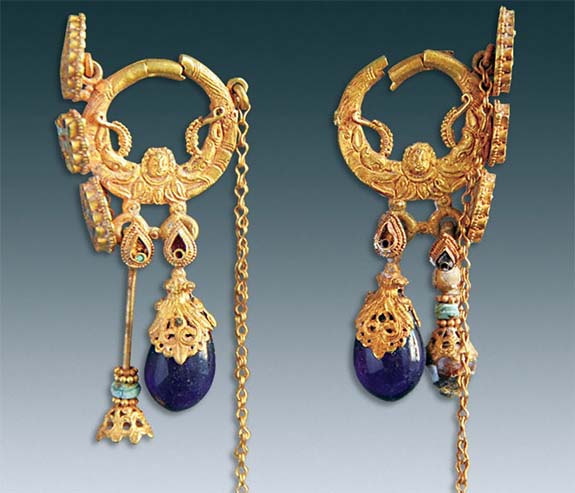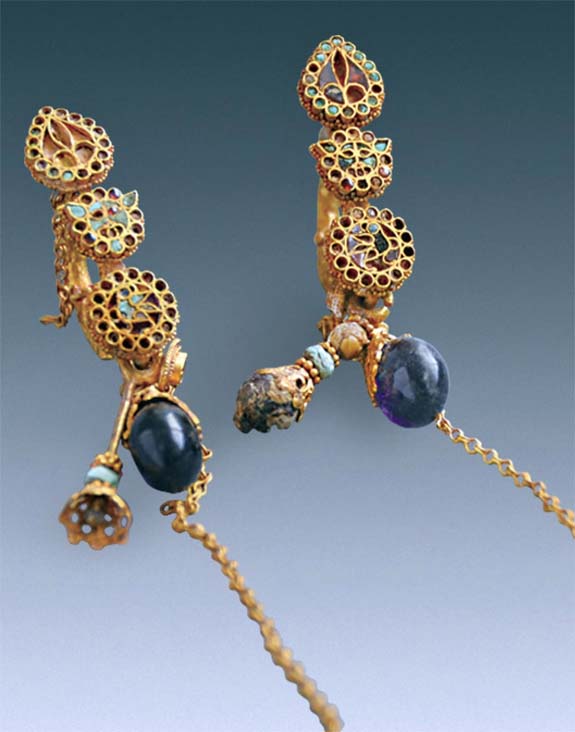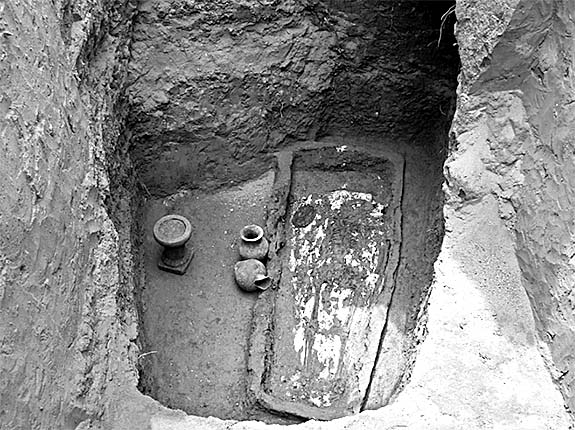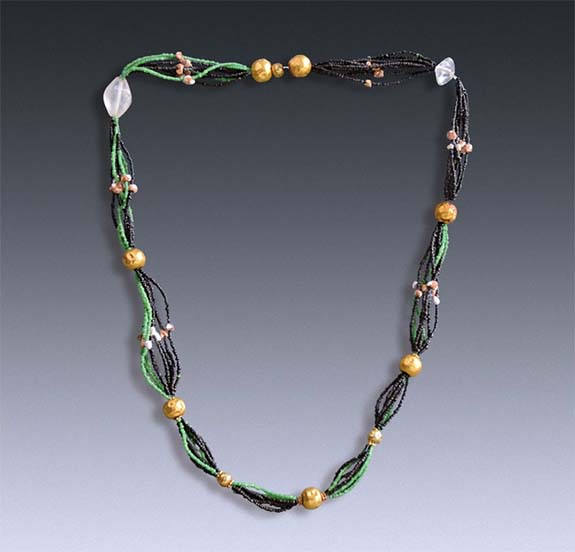August 18th, 2016
Fifteen hundred years ago in Datong City, China, there lived an aristocrat named Farong. The wife of Magistrate Cui Zhen, Farong owned an elaborate pair of gold earrings that demonstrated meticulous craftsmanship and amazing technical prowess.

The earrings were beautiful from every angle. From one view, one could see the likenesses of a human figure flanked by dragons.
The detailing was extraordinary. The human figure on the earrings had curly hair, deep-set eyes and a high nose. The character wore a pendant with a sequin-bead pattern on the neck and had inverted lotus flowers carved under its shoulders.

From the side, admirers would marvel at the round and teardrop-shaped adornments inlaid with multicolored gemstones. Delicate gold chains hanging from cabochon-cut amethysts dangled below, and one could imaging how they would have draped down the sides of Farong's face.
Also among her prized possessions was an elaborate necklace made from 5,000 pearls, gold pieces, crystals and colored glass beads.

A team of Chinese archaeologists with the Datong Municipal Institute of Archaeology unearthed Farong's tomb when they were surveying the area before a construction project. Although her skeleton was badly decomposed, her exquisite jewelry — which had been buried with her — remained in near-pristine condition. Farong's story was originally reported in the Chinese journal Wenwu and translated into English in the journal Chinese Cultural Relics.

The necklace consisted of 10 large and small gold beads, nine flat gold pieces, two crystals, 42 natural pearls and more than 4,800 colorful glass beads. The archaeologists explained that the small beads were "the size of millet grains, some black and some green, and all are [flattened], each with a perforation in the middle."
Although the thread on which the 5,000 beads were strung had disintegrated long ago, the beads remained in their original positions, making the reconstruction of the piece much easier for the archaeologists.
Farong's epitaph was discovered at the tomb's entrance. Carved into a stone tablet was the phrase: "Han Farong, the wife of Magistrate Cui Zhen." Han is her surname. (In China, the surname was traditionally written first and the given name second, according to Live Science.)
Farong lived in the capital of Datong City, about 215 miles west of Beijing, during the latter part of the Northern Wei Dynasty (386-534). Her age at death was unknown, but the story of her fine jewelry may live on forever.
Credits: Photos courtesy of Chinese Cultural Relics.

The earrings were beautiful from every angle. From one view, one could see the likenesses of a human figure flanked by dragons.
The detailing was extraordinary. The human figure on the earrings had curly hair, deep-set eyes and a high nose. The character wore a pendant with a sequin-bead pattern on the neck and had inverted lotus flowers carved under its shoulders.

From the side, admirers would marvel at the round and teardrop-shaped adornments inlaid with multicolored gemstones. Delicate gold chains hanging from cabochon-cut amethysts dangled below, and one could imaging how they would have draped down the sides of Farong's face.
Also among her prized possessions was an elaborate necklace made from 5,000 pearls, gold pieces, crystals and colored glass beads.

A team of Chinese archaeologists with the Datong Municipal Institute of Archaeology unearthed Farong's tomb when they were surveying the area before a construction project. Although her skeleton was badly decomposed, her exquisite jewelry — which had been buried with her — remained in near-pristine condition. Farong's story was originally reported in the Chinese journal Wenwu and translated into English in the journal Chinese Cultural Relics.

The necklace consisted of 10 large and small gold beads, nine flat gold pieces, two crystals, 42 natural pearls and more than 4,800 colorful glass beads. The archaeologists explained that the small beads were "the size of millet grains, some black and some green, and all are [flattened], each with a perforation in the middle."
Although the thread on which the 5,000 beads were strung had disintegrated long ago, the beads remained in their original positions, making the reconstruction of the piece much easier for the archaeologists.
Farong's epitaph was discovered at the tomb's entrance. Carved into a stone tablet was the phrase: "Han Farong, the wife of Magistrate Cui Zhen." Han is her surname. (In China, the surname was traditionally written first and the given name second, according to Live Science.)
Farong lived in the capital of Datong City, about 215 miles west of Beijing, during the latter part of the Northern Wei Dynasty (386-534). Her age at death was unknown, but the story of her fine jewelry may live on forever.
Credits: Photos courtesy of Chinese Cultural Relics.


